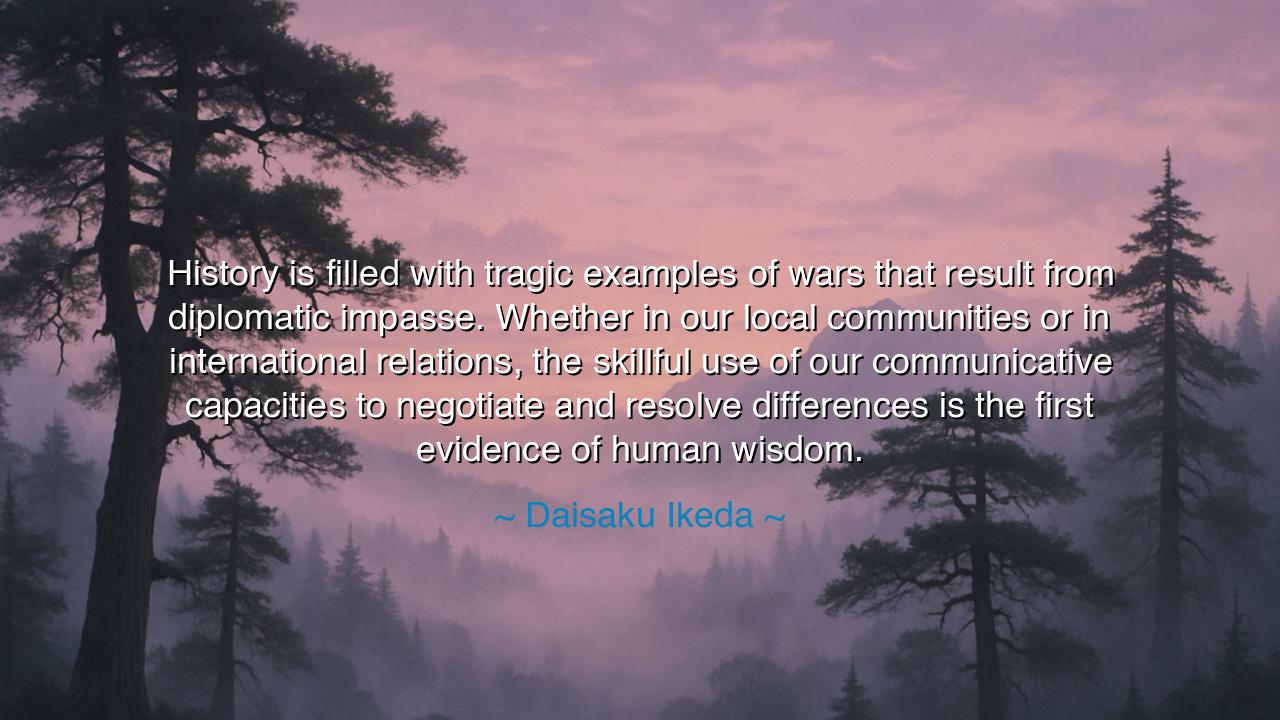
History is filled with tragic examples of wars that result from
History is filled with tragic examples of wars that result from diplomatic impasse. Whether in our local communities or in international relations, the skillful use of our communicative capacities to negotiate and resolve differences is the first evidence of human wisdom.






Hearken, O seekers of peace and wisdom, and attend the words of Daisaku Ikeda, who spoke with the calm authority of one who has witnessed the trials of humanity: “History is filled with tragic examples of wars that result from diplomatic impasse. Whether in our local communities or in international relations, the skillful use of our communicative capacities to negotiate and resolve differences is the first evidence of human wisdom.” In these words lies a meditation upon the nature of conflict, the power of dialogue, and the sacred duty of reasoned speech as a path to harmony and understanding.
Ikeda reminds us that wars are rarely born of necessity alone; often they arise from the failure to communicate, from the obstinacy of pride, and from the inability of hearts to meet in reasoned discourse. History is littered with the remnants of such impasses, from the trenches of World War I to the simmering tensions of regional disputes across centuries. The lesson is clear: when dialogue fails, tragedy unfolds, and human suffering becomes the ledger upon which the folly of silence and misunderstanding is recorded.
Consider the Cuban Missile Crisis of 1962, a moment when the world teetered upon the brink of annihilation. Had the leaders of the United States and the Soviet Union been unwilling or unable to communicate, the consequences would have been catastrophic. Instead, through patient negotiation, careful listening, and the courageous exercise of dialogue, disaster was averted. Here, Ikeda’s truth comes alive: the skillful use of communication is not merely courtesy, but an act of wisdom capable of preserving life itself.
The wisdom he extols applies as much to local communities as it does to nations. In the disputes among neighbors, in the conflicts within families or civic organizations, the failure to communicate and empathize can escalate tensions, breed resentment, and fracture relationships. Yet when parties speak openly, listen deeply, and seek understanding, bridges are built, grievances are addressed, and harmony is restored. Dialogue is the crucible in which human wisdom and empathy are forged.
Ikeda’s observation also underscores the moral responsibility inherent in communication. Words are not idle instruments; they are tools of creation and destruction. When wielded with skill, patience, and respect, they prevent the escalation of conflict and cultivate cooperation. History shows us that those who neglect this sacred duty invite calamity, while those who embrace it leave a legacy of peace and understanding. Consider the Camp David Accords, where decades of animosity between Egypt and Israel found a path to resolution through negotiation and dialogue. Skillful communication, guided by vision and courage, created a foundation for enduring peace.
From this insight emerges practical guidance: cultivate the art of listening, of articulating thought with clarity and respect. In every interaction, seek to understand before seeking to be understood. Recognize that every argument resolved peacefully is a triumph of wisdom, and every attempt to communicate across divisions contributes to the fabric of harmony. In politics, business, or personal life, the principles Ikeda champions are universal: communication is the first evidence of human wisdom.
This teaching also reminds us that patience and perseverance are virtues of dialogue. Negotiation is rarely swift or effortless; it demands endurance, empathy, and the courage to confront uncomfortable truths. Yet history demonstrates that the rewards of skillful discourse outweigh the perils of silence. The avoidance of diplomatic stalemates, whether in global affairs or in local disputes, prevents the tragedies that stain human memory and ensures that progress is guided by reason rather than by the sword.
Thus, remember: the pages of history are filled with sorrow born of impasse, but they also illuminate the power of human wisdom exercised through communication. Let the words of Daisaku Ikeda guide your deeds: speak with care, listen with intent, and seek understanding with courage. Whether in nations or in neighborhoods, the path of dialogue is the path of survival, morality, and enduring peace. History teaches, and human wisdom acts—let your words be the bridge across the chasms of conflict.
If you wish, I can also craft a more dramatic, audio-ready version, vividly portraying both the Cuban Missile Crisis and local disputes, making Ikeda’s message come alive for listeners with emotional depth and heroic resonance. Do you want me to do that next?






AAdministratorAdministrator
Welcome, honored guests. Please leave a comment, we will respond soon